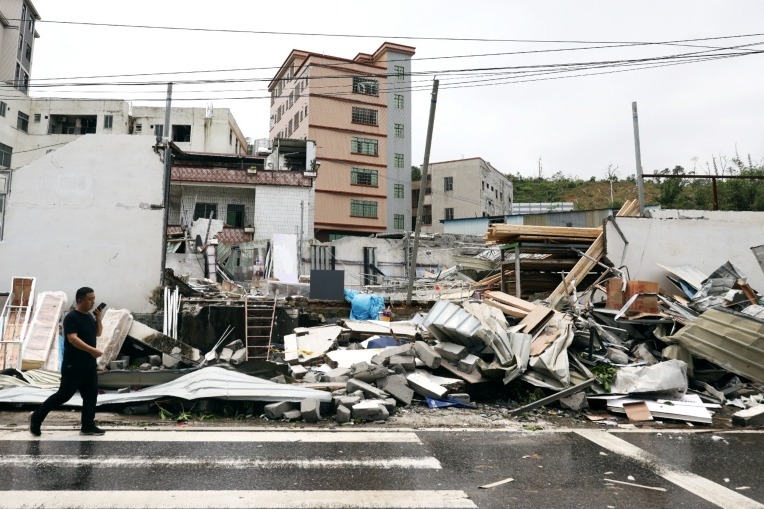White supremacy's deadly game with minorities

Cultural gap
The 16 or more hours each Korean family member put into a store to guarantee its survival had all "taken a toll", leaving the Koreans with "little time or energy to develop a relationship with their customers and community", said Zia. The issue was compounded by their lack of cultural savvy and limited English ability.
Discontent grew. In a 1988 boycott following a scuffle between two black women and a Korean market proprietor in Brooklyn, New York, black organizers called the Korean merchants "agents of the US government to destabilize the economy of our community".
Kyeyoung Park, who mentored Kurashige on that fateful day of April 29, 1992, later wrote that it was hard for the black poor to think of the lifestyle of a posh white neighborhood. So when they see "the (Korean) merchants who ring the cash register", they were tempted to blame them for their economic disenfranchisement, despite the huge profits being made by big corporates who were behind the store owners and the decision of the financial establishment to disinvest in black businesses and withhold loans.
Earlier this year, Michael Eric Dyson, a black author and academic, told an online forum: "The way in which American capitalism has operated at the behest of white supremacy is to deny legitimate opportunities to the African-American people and to give crumbs to Asian brothers and sisters while demonizing them as the origin of the invidious practices that we need to call out."
Dyson was also quick to point out the internalized racism on both sides: the anti-blackness the Koreans, like other immigrants, had assimilated as they became Americanized, and the anti-Asian scapegoating and xenophobia that the blacks, being native-born Americans, were susceptible to. The latter went back to the talk of "yellow peril" and the Chinese Exclusion Act of the late 19th century.
Their feelings wounded by "yet another ethnic group advancing at their expense" to use Zia's words, the blacks were largely unaware of the fact that these "model minorities" were very often the "middleman minorities". Sandwiched between the society's dominate (white) and subordinate (black, Latino) groups and holding professions heavily concentrated in the retail and service industries, the "middleman minorities" — a term frequently used by race scholars today — had daily contact with black Americans in a way that white Americans often do not due to segregated neighborhoods and schools.
The contact had led to both conflicts and cooperation, said Kurashige, who insists on calling the 1992 Los Angeles Riots "the LA Rebellion".
"If you call it a riot, then a natural solution would be to call for the police, whose brutality gave rise to the riot itself," he said. "The word rebellion recognizes an anger that's justifiable and calls for efforts that would eventually move people beyond rage into community building and investing in cross-racial human relations."
"Break bread and share stories"-that's the advice from Zia, who has long been involved in the Asian-American movement, which was directly inspired by the civil rights movement of the 1950s and 60s. "It's no coincidence that the term 'model minorities' was born in 1966 during the height of these struggles," she said. "There were active efforts to divide people."
And people need to look at nowhere else than Los Angeles in April 1992 to understand how the term had distorted the image of Asian Americans at the expense of the blacks. Instead of acting with resignation as the stereotype would have expected of them, the Koreatown residents, whose male members had often received military training back in South Korea, took to their guns in defense of their family and property.
Yet their effort didn't constitute much. With little initial intervention from the city's mayor and the police department, Koreatown was effectively left to burn since "it was a neighborhood that was brought up and populated by people who were themselves marginalized", to use the words of Alex Ko, a second-generation Korean American who speaks in a 2020 documentary about his family experience during the riots.
For many in the Korean and the black communities, that revealed white supremacy as at the crux of things. In the aftermath, a younger generation of Asian Americans including Kurashige rebelled against any racial profiling — and sometimes their own elders — in ways that linked their own fate to that of their black neighbors.
"The model minorities myth was foundational to the whole concept of the Asian-American movement in the sense that much of the defining of this diverse group started with the rejecting of that notion," said Kurashige, who recounted in his book the story of a black woman sending high-school yearbook copies to her Japanese-American classmates put into internment camps during World War II.
In a not so distant echo, Zia cited in her book a brief note left by an anonymous person to a Korean grocery store owner, together with a small donation, during an 18-month black boycott of Korean-owned businesses starting from 1990 in Brooklyn, New York. Taking place at a time of severe economic downturn that had disproportionately affected the black community, the boycott was accompanied by occasional clashes between blacks and people who were either Korean or looked Korean.
"I am a black American born in Brooklyn raised 20 years in Bedford-Stuyvesant … If any man has the authority to throw the first stone at his neighbor, it should be me," the note goes. "Instead I only feel LOVE."























